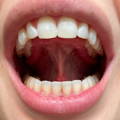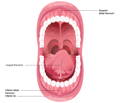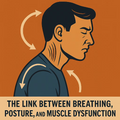Guide to Frenectomy, Tongue Tie, & Lip Tie Release
Transformative Outcomes:There are many potential improvements after a frenectomy.
Expert Care:Orofacial Myofunctional Therapy for aids in optimal outcomes and lasting results. We refer only to an experienced frenectomy specialist in Ottawa using the latest technology.
Personalized Approach:Tailored treatments before, during, and after a frenectomy for both adults and children.
Benefits of Tongue Tie Release

Improved Breathing
Enhanced airway function reduces snoring and sleep apnea.
Clearer Speech
Better articulation of sounds and words.
Better Eating
Easier swallowing of food and drink. Reduced digestive distress.
Enhanced Oral Health
The reach of the tongue contributes to your oral hygiene.
Relief From Jaw Discomfort
Reduced tension and pain in the jaw, neck, and shoulders. Headache relief.
Improved Ortho Outcomes
Increased effectiveness of orthodontic treatments.
Benefits of Lip Tie Release
Improved Breastfeeding
Better latch leads to effective feeding and healthy weight gain in babies.
Enhanced Speech
Improved ability to form sounds and words clearly.
Improved Dental Health
Prevention of gaps, bone loss, and misalignment in teeth.
Prevent Mouth Breathing
Able to close lips together more comfortably, encouraging nasal breathing.
Reduced Pain
Alleviation of chronic neck, shoulder, and back pain.
Better Sleep
Decrease in sleep apnea and mouth breathing issues.

Myofunctional Therapy Process Overview

01. Free Consultation
Comprehensive evaluation to determine the need for a frenectomy and develop a personalized treatment plan. Referral to a local Frenectomy Specialist.

02. Pre-Frenectomy Exercises
Customized exercises to prepare oral tissues and muscles for the procedure, for a better long-term prognosis.

03. Guidance During Procedure
Real-time guidance enhances the effectiveness of the release, and post-operative wound care.

04. Post-Care Support
Post-procedure exercises to prevent reattachment and promote proper healing.
Reducing the risk of needing additional procedures in the future.
Potential Symptoms of Tongue Ties &
Lip Ties
Tongue Tie Symptoms (Ankyloglossia)
Tongue Mobility
- Difficulty lifting & moving tongue.
- Challenges with lip licking, eating, drinking.
- Speech difficulties.

Oral-Facial Disorders
- Headaches.
- Chronic jaw, neck, or upper back pain.
- Sleep disordered breathing, or Sleep Apnea.
- Trouble transitioning to solid foods.
- Speech delays.
- Difficulty breastfeeding (poor latch, slow weight gain).

Lip Tie Symptoms
Physical Attributes
- Gum recession, and/or bone loss.
- Gap between front teeth.
- Narrow palate (roof of mouth), teeth crowding.

- Frequent sinus infections.
- Mouth breathing.
- Sleep disturbed breathing or Sleep Apnea.
- Fussiness during feeding.
- Poor weight gain and frequent nursing sessions.
- Difficulty breastfeeding: struggling to latch, discomfort while nursing, or engorged breasts.

Guidance for a Smooth Frenectomy Journey
Get the support you need to prepare for and navigate the frenectomy procedure, aiming for the best possible prognosis.
By Jan 04, 2026
By Oct 12, 2025
By Oct 01, 2025
By Aug 10, 2025
By Jul 10, 2025







